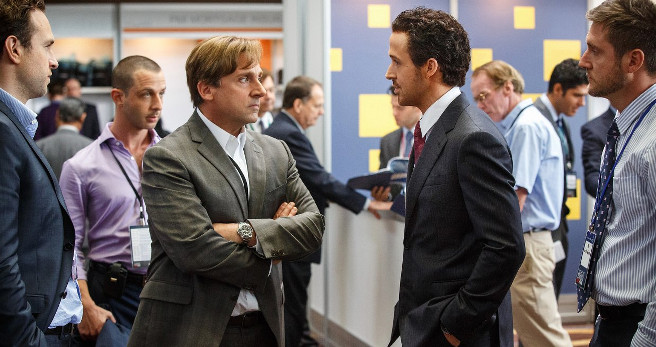In the film that closed AFI Fest 2015, “The Big Short,” someone did the math. Then other people checked the numbers and eventually found to their surprise and disgust that not only was that person right, but the system was corrupt. That might sound boring, but as written and directed by Adam McKay, the movie is a darkly funny account of the credit and housing financial crisis of 2007-2010 and how different groups of people made money off of the dishonesty and misery of others.
That housing and credit crisis also sparked a global financial crisis which some say was worse than the Great Depression of the 1930s. McKay‘s film is based on a 2003 book by Michael Lewis, who also wrote “Moneyball: The Art of Winning an Unfair Game” and “The Blind Side,” both adapted into award-winning films.
“The Big Short” begins with a quote from Mark Twain: “It ain’t what you don’t know that gets you into trouble. It’s what you know for sure that just ain’t so.” As both writer and director, McKay doesn’t rely upon realism here; that would be too boring. Instead, we are guided through the world of finance by an unreliable narrator, Jared Vennett (Ryan Gosling). Vennett is based on a real person (Greg Lippmann) and breaks the fourth wall as do many of the other characters, even informing us what is convenient Hollywood contrivances and explaining to us what the reality was.
The man who began crunching the numbers was a brilliant, but socially awkward man with a glass eye, Michael Burry (Christian Bale), an American hedge fund manager. Burry was an undergrad, studying economics with a pre-med focus and then went on to graduate from Vanderbilt University School of Medicine. He did his residency at Stanford, but quit medicine to start Scion Capital. At Scion Capital, he had his people do the research and came to the conclusion that the American housing was built on a bubble that is ready to burst. The title refers to Wall Street slang for going short, betting that the stocks you buy will fail. In this case, the investment is the securitized subprime home mortgages.
Burry’s investments come to Vennett’s attention but no one at his work place believes him. As a result of a mistake, Vennett brings this financial opportunity to the attention of Mark Baum (Steve Carell) in a presentation with Jenga blocks that will visually simplify the problem for most viewers. “They call me Chicken Little. They call me Bubble Boy,” Vennett explains, but adds, “I’m standing in front of a burning house and I’m offering you fire insurance.”
Baum is a man suffering from an inability to speak about a personal tragedy for which he’s in therapy. He has an anger at a system that takes advantage of regular folks. His wife complains to him, “You’re running around like you have to right every wrong.” And there’s a lot wrong on Wall Street and in U.S. banks. Baum (based on Steve Eisman of FrontPoint Partners), takes his group which includes Vinny Daniel (Jeremy Strong) to Orlando, Florida to investigate Vennett’s assertions.

The movie also follows Charlie Geller (John Magaro) and Jamie Shipley (Finn Wittrock), small-time investors who stumble upon Burry’s write-up on his investment strategy while in New York and get a former major Wall Street trader, Ben Rickert (Brad Pitt), to help them get in on the action. At one point, the groups converge, but don’t actually meet in Las Vegas.
McKay and his editor give us a lot of information via montage, on-screen text, flashback history lessons, and pop culture cameos with Margot Robbie (“When you hear ‘subprime,’ think shit“) and Selena Gomez to explain financial concepts. Yet, at the end of the movie, when we find out what happened to all the groups concerned, the lasting impression should be one of outrage that the banks were bailed out by taxpayers and only one person went to jail.
At a Q&A that followed a special screening, Plan B Entertainment’s co-president, Jeremy Kleiner (“12 Years a Slave“) commented that Plan B likes stories that question prevailing wisdom. That was true of “Moneyball” and Kleiner said, “‘The Big Short’ had that element … and the main characters are not your typical heroes.” He continued, “There’s an ambiguity, a complexity as to where these characters are and how they act.”
As you might imagine, McKay was worried about “how we could illustrate the financial concepts.” Before reading the book, he knew that “some weird shit had happened in 2008” and he read Lewis’ book in one night and he loved it. “It got me excited” about “the gestalt of the moment” even though “I knew we had a not-so-great ending, a really upsetting ending.”
Strong, who plays Vinny Daniel, commented that “We all felt a great responsibility to represent the people we were playing in a real way … my character and Steve’s character shared a pessimism. We tried to be true to them, distilling their essence.” He felt his character was not unlike “De Niro’s character in ‘Casino,'” a degenerate gambler with “a profound mistrust of the world.”
Christian Bale got some tactile input from the Burry who was on the set and appears briefly in the movie. “He sent me clothes because he’s very particular. He only wears a certain kind of shorts, a certain kind of shirt and a certain kind of sandals.” Bale admitted that as an actor “you do feel like a creepy stalker, but one he kind of ‘enjoys.'” He continued, “As you saw, he’s a very unusual character. He does things his way,” but he also noted that one breakthrough to his portrayal was noticing that Burry had “a very unique breathing pattern.” To be fair, Burry believes that like his son, he has Asperger’s syndrome.

Gosling commented that being an actual person in the movie yet also serving as the narrator and the tour guide was tricky and compared it to “being Bugs Bunny and Daffy Duck.” Lewis explained, “He’s an unreliable narrator who is telling the truth. He’s telling the truth but everyone thinks he’s a liar.” What Gosling did enjoy was breaking the fourth wall. “I grew up watching ‘Saved by the Bell,’ but was shamed for even looking a little bit” at the camera; being able to look directly at the camera felt good.
McKay explained that one of his concepts was that in a world where people are more attuned to pop culture he thought what if “the white noise of pop culture was actually telling us informative things.” As a fan of Anthony Bourdain, he remembers his fish stew. In the book, McKay also felt that Lewis broke the fourth wall in the book when he made comments in the footnotes.
McKay also admitted there is a problem with the movie’s main characters. It is hard for audience members to fully support any of them. “In a world where everything is compromised, where everything has been compromised, who are the heroes?” McKay asked. For that reason, the heroes in “The Big Short” are “not pure heroes—that’s how debased this world became.”
Lewis does wonder if the movie will “have an effect on the system.” He added, “It’s very frustrating that more hasn’t happened since the financial crisis,” yet he feels there is a movement and this movie is part of that movement. For that reason, he feels “The Big Short” is “a really important movie. A book can only do so much.”
Of the five gala movies at AFI Fest, three were based on true stories and one was a documentary. These movies, “The 33,” “Where to Invade Next,” “Concussion” and “The Big Short” ask us to question the status quo. “The 33” and “The Big Short” illustrate that the managers of the world might not have the interests of the common person in mind while wheeling and dealing. “Concussion” shows how one man fought the system (NFL) and was eventually vindicated. “Where to Invade Next” and “The Big Short” seem like calls to action.
Take the call. Watch “The Big Short” (and “Where to Invade Next”). “The Big Short” is one of the more entertaining lessons in contemporary history and math you’ll see.












